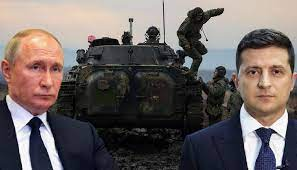- However, Russia has clarified that it has no plans to invade Ukraine.
What does Russia want now?
- Talks to discuss implementation of previous commitments on NATO expansion.
- NATO troops moving out of Post-Soviet States.
- A commitment that Ukraine will not be given NATO members.
- Security guarantees for the future.
What do US and European states that form NATO want?
- Russian troops to pull back from borders.
- Russia to stop war games in neighbouring countries like Belarus.
- Willing to discuss security guarantees, but no commitment on independent states joining NATO – according to a letter leaked to a Spanish newspaper.
- Wants guarantees that Russia will not invade Ukraine- Russia has said it has no intention to —but troops amassed are worrying.
- Pakistan Occupied Kashmir
- Pradhan Mantri Matru Vandana Yojana
- National Land Monetisation Corporation
- ICC U-19 World Cup 2022
- Lata Mangeshkar: 10 lesser-known facts about the ‘Nightingale of India
- Delimitation Panel
- India’s stakes in its ties with Ukraine & Russia?
- Kerala Governor signs Lok Ayukta ordinance
- Happy Rose Day 2022: Wishes, Greetings, Images, Pics, Facebook And WhatsApp Status
- Gulf Oil Lubricants India Ltd. Target Price 790 (Short Term Target 540)
India’s greatest concerns are:
- World War scenario: Any conflict- where the U.S. and its European allies are ranged against Russia will impact the whole world- economically and in terms of security, and India, as a partner to both Moscow and Washington will either have to take sides, or be prepared to deal with unhappiness from both sides.
- S-400 delivery and US waiver: The crisis comes precisely as India’s purchase of the Russian S-400 missile system is under way- and New Delhi hopes for a waiver of U.S. sanctions on this. Conflict will complicate both the delivery of the system, and the possibility of a presidential waiver.
- Moves focus from China: Just as U.S. and Europe had grown more focussed on their Indo-Pacific strategy that puts India centre-stage, and India grapples with Chinese aggression and land-grab at the Line of Actual Control, and 100,000 troops along the boundary on both sides, the world’s attention is diverted from China to Russia.
- Brings Russia China closer- the Crisis will make Moscow more dependent on friends like China, and build a regional bloc of sorts that India is not a part of. In Beijing this week, the future seems evident- as India has announced a diplomatic and political boycott of the Olympic games- while Putin, Central Asian Presidents, and Pakistan PM Imran Khan are all in Beijing to stand in solidarity with Xi Jinping.
- Energy crisis: In any conflict- Europe worries Russia will turn down gas and oil supplies- driving energy prices up. Already tensions have pushed oil prices up 14% in a month past $90 and analyst say they could hit $125 a barrel if the situation is not resolved.
What is the conflict all about?
Tensions between Ukraine and Russia, both former Soviet states, escalated in late 2013 over a landmark political and trade deal with the European Union. After the pro-Russian then-President, Viktor Yanukovych, suspended the talks, weeks of protests in Kiev erupted into violence.
- Then, in March 2014, Russia annexed Crimea, an autonomous peninsula in southern Ukraine with strong Russian loyalties, on the pretext that it was defending its interests and those of Russian-speaking citizens.
- Shortly afterwards, pro-Russian separatists in Ukraine’s Donetsk and Luhansk regions declared their independence from Kiev, prompting months of heavy fighting. Despite Kiev and Moscow signing a peace deal in Minsk in 2015, brokered by France and Germany, there have been repeated ceasefire violations.
- Pakistan Occupied Kashmir
- Pradhan Mantri Matru Vandana Yojana
- National Land Monetisation Corporation
- ICC U-19 World Cup 2022
- Lata Mangeshkar: 10 lesser-known facts about the ‘Nightingale of India
- Delimitation Panel
- India’s stakes in its ties with Ukraine & Russia?
- Kerala Governor signs Lok Ayukta ordinance
- Happy Rose Day 2022: Wishes, Greetings, Images, Pics, Facebook And WhatsApp Status
- Gulf Oil Lubricants India Ltd. Target Price 790 (Short Term Target 540)


No comments:
Post a Comment